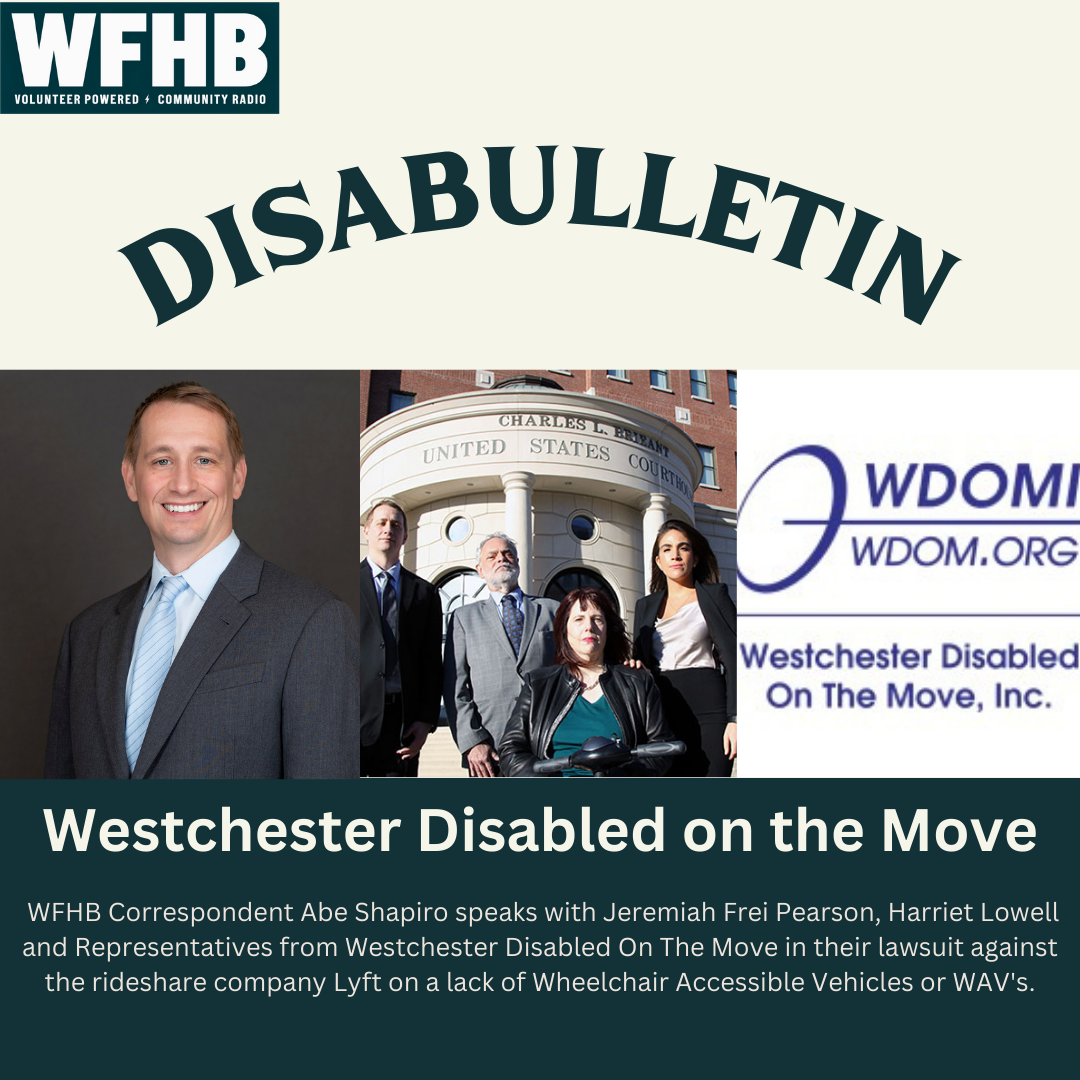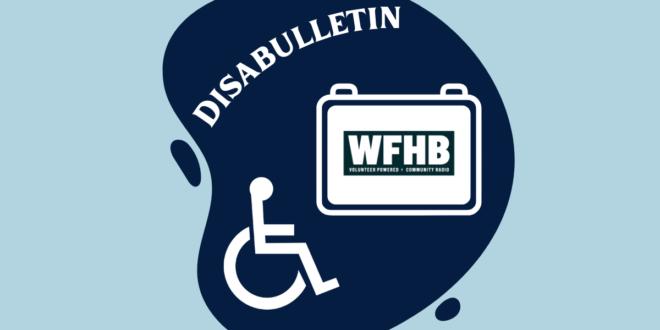Podcast: Play in new window | Download (Duration: 16:47 — 15.4MB)
Subscribe: RSS
SHAPIRO:Good evening, I’m Abe Shapiro and this is Disabulletin, where we cover the top stories impacting the disability community across the country and around the world. Over the last five years on the banks of West Plains, New York, the transportation company Lyft has been embroiled in a lawsuit with Westchester Disabled On The Move, or WDOMI, a disability rights organization headquartered in Westchester County, New York. In the lawsuit, WDOMI argues that Lyft is violating the Americans with Disabilities Act or ADA by not providing wheelchair-accessible vehicles or WAVs, for non-foldable wheelchairs. The original lawsuit was filed in 2017 by Harriet Lowell of White Plains, New York, on behalf of individuals with mobility disabilities who are “pervasively, and systematically excluded” from Lyft’s convenient transportation services, as Lyft does not provide wheelchair-accessible vehicles in White Plains where Lowell is located. Yesterday, I spoke with Jeremiah Frei Pearson, the lawyer fighting on behalf of Westchester Disabled On The Move in their lawsuit against Lyft, who has previously appeared on our program, along with his colleague, Erin Kelly, Harriet Lowell, the plaintiff in this case, and Mel Tanzman, the executive director and representative of WDOMI, the second plaintiff in this case.

SHAPIRO:We began by asking Tanzman about how the case began, followed by Harriet Lowell then Jeremiah Frei Pearson.
SHAPIRO:What led to this organization taking on a big entity like Lyft?
TANZMAN: It started for us back in, I guess it was 2016 or 2017, where Lyft, as well as all the ride-sharing services, were trying to get a state law passed, that would allow them to spread throughout New York. Now, we have no problem with that, because people need transportation. But what we did have an issue with was the availability of wheelchair-accessible vehicles. We got involved at that point, representatives from independent living centers were on a panel that was set up after they passed a law that talked a lot about accessibility. And that’s when we really got involved with it. I mean, I’ve gotten many calls throughout my 20-year career from people visiting New York, who use wheelchairs and often, I didn’t have much to offer. And it seemed to me that Lyft is an essential part of the transportation system.
LOWELL:Back in 2017, Jeremiah [Frei Pearson] and I were working on getting accessible taxis in New York City, and Lyft and Uber were coming in. And I was discussing my personal struggle, because I am a non driving scooter user, and my husband drives me but he can’t always do that. It’s a real problem. And so that’s what led to this case.
FREI PEARSON:And for for myself, the rights of people with disabilities are really important to me, I have a brother with very significant disabilities.
SHAPIRO:Frei Pearson then provided a lowdown on the facts of the case, Lyft’s main arguments for why it cannot provide access to people in wheelchairs, and how the Americans with Disabilities Act or ADA, the primary Civil Rights Act for individuals with disabilities, impacts this case.
FREI PEARSON: Lyft serves able-bodied people everywhere in the country, no matter what the population density no matter what the service level is. But for people in wheelchairs, Lyft refuses to serve them in 96% of the country, except for nine regions where regulators make Lyft provide service. So you have a scenario where New York City regulators forced Lyft to provide wheelchair-accessible vehicle service. In New York City, if you pull up your Lyft app, there will be WAVs. If you cross the street from the Bronx into Westchester County, Lyft starts blocking WAV service and Lyft has taken the position [and] its taken a bunch of obscene positions. Its argued it’s not a transportation company. Its argued the Americans with Disabilities Act doesn’t apply to it. But it now argues in essence that it can, as one of the largest transportation companies in the country, refuse to serve people in wheelchairs in 96% of the country. And because Lyft is a new cutting-edge corporation, if Lyft and Uber can get away with this, they’re going to move us backward. And the ADA is all about moving us forward. I’m pretty sure this is a case under title three, of the ADA which forces private entities, and in particular public accommodations, to serve people with disabilities. The basic point of the ADA is if you operate a public accommodation, you have to make reasonable accommodations to your services to allow people with disabilities to have the opportunity to participate. And Lyft’s position is first, that it is not a public accommodation, which is insane. Second, that its not a transportation provider, which is insane. And third, there’s nothing it can do to serve people with disabilities in the 96% of the country where it refuses to serve people with disabilities. And that’s insane because in 4% of the country it does. So how hard is it just to do what you do in the 4% in the other 96%?
SHAPIRO:A common concern amongst ride-share companies is that there is an insufficient supply of WAVs in the country to provide on-demand service and the cost of modifications. Some companies suggest that lowering the floor then adding a wheelchair ramp and securement device for a wheelchair to an already existing vehicle adds “15 to $30,000″ to the overall cost of such a vehicle. In an email, a Lyft spokesperson said “Lyft has a long-standing commitment to maintaining an inclusive and welcoming community. And we’re constantly seeking solutions to address wave supply challenges.”
SHAPIRO:I also asked Jeremiah Frei Pearson how Lyft might prevent people from obtaining access to WAVs in other parts of the country using a toggle and blocker. And if it is possible for both tools to be removed by Lyft. Frei Pearson elaborated:
FREI PEARSON:In some of the cities where Lyft has been forced to provide wheelchair-accessible vehicle service, it uses the toggle to suppress service. And briefly what the toggle is is [that] all ride modes appear, except for wheelchair-accessible vehicles. And every other ride mode that Lyft has, will appear automatically on your phone if it’s available. So you can pull up your phone and you can see Lyft Green you can see Lyft Lux, you can see Lyft XL they’ll just automatically appear. But in some cities, Lyft has done it. So to find WAV service, you have to use a toggle, which is this complicated series of hoops you have to jump through to find WAV service. In New York City, they ordered Lyft not to use the toggle, and WAV service increased by 500%. So one of the things that we’re asking for is once Lyft stops nationwide discrimination and turns off the blocker, they shouldn’t be allowed to turn on the toggle and suppress WAV service. Those are all things we’re going to be asking the judge for. But the first and most important thing is just stop blocking service. It’s not difficult at all. What Lyft does is in the 4% of the country, if you say hey, I have a wheelchair-accessible vehicle and you’re a Lyft driver, then Lyft makes it known that there’s a wheelchair-accessible vehicle that’s available. And if you need a wheelchair-accessible vehicle, you can call it.
FREI PEARSON: In 96% of the country, Lyft blocks you from saying “hey, I have a wheelchair-accessible vehicle or hey, I need a wheelchair-accessible vehicle”. One ironic thing is one day Lyft’s programming got messed up and it turned its blocker off in Denver. And all of a sudden, all these people were like, “Hey, I have a wheelchair-accessible vehicle, I want to give a ride in Denver”, but in Denver, Lyft isn’t forced to provide this service. So what did Lyft do? Did they allow the rides to happen? No, no, no, it dropped everything and kept blocking. So actually our expert helped force Lyft to provide good service in New York City. And we have detailed proposals for how Lyft can provide the best service. But our first request is really simple: Lyft needs to stop blocking WAV service everywhere in the country. That will cost Lyft virtually no money. And the result will be transformative, it’d be good if Lyft which pretends to be a progressive company, stop discriminating.
SHAPIRO: I asked [Harriet] Lowell about how the lack of wheelchair-accessible vehicles impacts her daily life, and what she along with WDOMI and the disability community of Westchester sought from the case.
LOWELL: There have been times when my husband was in the hospital, he had a pulmonary embolism twice. I couldn’t get to the hospital because he couldn’t drive and he was in the hospital. And many other less dire things happen. But if I need to go someplace and I want to go on my own, I should have the same rights as non-disabled people throughout Westchester and throughout America. There are a lot of people like me in this area and throughout America. And there’s no reason why we shouldn’t be served the same way as everybody else.
SHAPIRO:I asked Frei Pearson about the regulation of such rideshare companies in New York State.
SHAPIRO:The Taxi and Limousine Commission of New York is one of the primary regulatory agencies right regarding transportation in the in the state is that correct?
FREI PEARSON: New York State regulation is very complex. The TLC authority in New York City is wonderful in forcing Lyft to provide WAV service. Lyft provides WAV service in New York City that is qualitatively better than their standard service in much of the country outside of New York City. Lyft has been able successfully to avoid any regulation that forces it to provide WAV service, which is why they block as soon as the cars drive out of New York City, Lyft blocks any WAV service and unfortunately, no regulatory body has stepped up and directly fixed that. Although we have heard from many people who wrote laws like the New York State Human Rights Law [who] say, we wrote that to cover companies like Lyft. And our court case is how we’re going to force Lyft to follow the law.
SHAPIRO: Frei Pearson also spoke about those who have come out in support of the organization’s litigation campaign.
FREI PEARSON:One thing I want to just emphasize is how much has gone into this case. We’ve had organizations like Paralyzed Veterans of America provide their testimony to the court and Paralyzed Veterans of America has a powerful story to tell. These are heroes who are fighting for our freedom fighting in our wars abroad, who in many circumstances, lost their ability to walk, they became paralyzed. And so they’re fighting for the rule of law. And then they come back to this country and a multibillion-dollar corporation says the rule of law doesn’t apply to it, and it can discriminate against them. And all of those people, including Paralyzed Veterans of America, stood up in federal court and said no, under the ADA, we want to be served. Their voices have been heard by the judge. And when we go to trial, I think their voices are going to be heard. And we’re going to make real change.
SHAPIRO:WDOMI Executive Director Mel Tanzman clarified WDOMI’s stance on alternative transportation for people with disabilities, but reiterated WDOMI’s stance, and shared the story of the late advocate, Ansel Lurio.

The Late WDOMI Activist Ansel Lurio
TANZMAN:We don’t expect that Lyft is going to be a perfect service. I don’t believe there is a perfect service, especially for providing transportation for people with disabilities. What we want is that to be one of many choices, because when systems fail, it’s always important to have a backup. So Lyft would provide that if they had wheelchair-accessible vehicles. And one thing I’d like to add, it became very personal for Westchester Disabled On The move when a person who was a consumer at the time but later on became a board member told a story to us. There was a freak early snowstorm, I think mid 2018. He used a wheelchair and had muscular dystrophy. He had been out at his doctor’s appointment at a clinic in Mount Vernon. When the freak snowstorm happened, paratransit, which he usually used, canceled, because Beeline system, which is the regular bus system, closed all its routes down. So when the Beeline system goes down, so does paratransit. So he found himself stranded there in Mount Vernon, when he had to get home, and he couldn’t go on the streets in his power wheelchair, there was too much snow and too much of a mess at the time. And he tried, he wanted to have something like a Lyft there. Ultimately, what had to happen was, the only way they could get him home eventually, was to first take him to the emergency room of a hospital. In other words, having to call an ambulance as if he had an emergency and had to be assessed in an emergency room, if not admitted. So, that was a frustrating process. We lost him last year, from muscular dystrophy, it’s usually something that takes people’s lives. So it did become very personal to us. Ansel was a remarkable human being. When you get to know the people and the people impacted by it. it does become a very personal struggle for you.
SHAPIRO:In 2021, a judge in the Northern District of California ruled that the lack of wheelchair accessible vehicle service on the Lyft platform does not constitute discrimination under the ADA. I asked Jeremiah Frei Pearson about this decision and how the upcoming Lowell and WDOMI case would argue differently.
FREI PEARSON:There was a similar case like this in San Francisco that Lyft won and they argued to a federal judge who believed them that there weren’t enough wheelchair users in the city of San Francisco to have a class action. They persuaded a federal judge there were not 40 wheelchair users in San Francisco who would use Lyft. With all due respect, that’s just wrong on the law. And our judge didn’t agree with it. But the reason they were able to persuade a judge of that is they have infinite resources. They’ve employed two law firms, they’ve spent millions of dollars fighting this case. And I guess the big question that flows out of this is why. Why is Lyft trying to invest so hard in being on the side of discrimination? Lyft’s entire business model is about not being regulated. They’re an app, they’re not a transportation provider. They don’t have to pay their workers under the labor laws. So they don’t want to have to serve people with disabilities, they don’t want to be made to do it. And it’s really unfortunate, they’re going to throw everything in the kitchen sink, and we’re going to have a trial. But I think in this case, we’re fortunate enough to have, first of all, just human beings who are right. You can’t sit down and hear Ansel’s story and hear Harriet’s story and think it’s okay for a major corporation to refuse to serve them. And second of all, I’m blessed to be part of a really talented legal team. When Lyft convinced a federal judge that there weren’t 40 wheelchair users in the city of San Francisco, we beat that by going out and getting hundreds of declarations, sworn pieces of testimony saying, “Hi, I’m a wheelchair user, and I want to use Lyft”. And our judge cited that and so we just got more than 40 people to testify. So that Lyft’s ridiculous argument that there just aren’t people with disabilities, wasn’t effective. And they’re going to come up with a lot of clever arguments. It’s going to be our job to beat them back. And that’s really how all big fights for change happen. We have a major corporation that’s willing to invest millions of dollars to break the law and discriminate. They get beaten because people like Harriet, people like Mel, people like Ansel have the courage to stand up, and lawyers have the courage to fight them.
SHAPIRO:The next hearing on this case has been scheduled for August 30 from White Plains. Next time, we’ll provide more highlights from our interview. Abe Shapiro, WFHB news, Live and Learn!
 WFHB Bloomington Community Radio
WFHB Bloomington Community Radio


